| Srl | Item |
| 1 |
ID:
076443
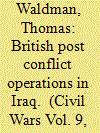

|
|
|
| 2 |
ID:
166592
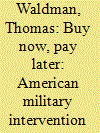

|
|
|
|
|
| Summary/Abstract |
This paper explores the notion that US efforts to evade the political costs of war paradoxically contribute to the subsequent exacerbation of costs over time. Leaders seek to purchase political capital in the short term by limiting the costs and requirements of military operations, but in doing so cause strategic and political liabilities to mount in the long run. While identification of such behaviour is not new, insufficient attention has been devoted to explaining its causes, dynamics, and manifestations in relation to key decisions on and in war. Evidence derived from studies of recent American discretionary campaigns is analysed to advance an argument with respect to this pattern of self-defeating strategic behaviour.
|
|
|
|
|
|
|
|
|
|
|
|
|
|
|
|
| 3 |
ID:
114614
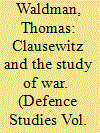

|
|
|
|
|
| Publication |
2012.
|
| Summary/Abstract |
Carl von Clausewitz produced what is widely recognised as the greatest book on war. Less commonly appreciated is the nature of the approach he adopted which enabled him to arrive at his central theoretical conclusions. In the course of his studies Clausewitz confronted a number of central methodological dualisms. He believed the tensions inherent in these pairs could not be ignored and ultimately sought to reconcile their apparent contradictions through a dialectical process of intense reflection and study. Knowledge of such issues offers students of war and strategy a valuable methodology in coming to grips with such a vast and complex subject.
|
|
|
|
|
|
|
|
|
|
|
|
|
|
|
|
| 4 |
ID:
104263
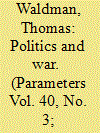

|
|
|
| 5 |
ID:
134484
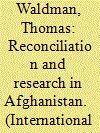

|
|
|
|
|
| Summary/Abstract |
This article examines the evolution of western policy towards the idea of pursuing negotiations with the Taliban, or ‘reconciliation’, in Afghanistan and the role that research and expert opinion played in that process. The official western position has evolved iteratively from initial rejection to near complete embrace of exploring the potential for talks. It is widely assumed that the deteriorating security situation was the sole determinant of this major policy reversal, persuading decision-makers to rethink what had once been deemed unthinkable. Moreover, given the politicized and sensitive nature of the subject, we might expect the potential for outside opinion to influence decision-makers to be low. Nevertheless, this article demonstrates that it would be a mistake to underestimate the role that research and expert knowledge played—the story is more nuanced and complex. Research coalesced, sometimes prominently, with other key drivers to spur and shape policy change. Importantly, it often took experts to make sense of events on the ground, especially where the failure of the military approach was not recognized, understood or palatable to those in official circles. Research interacted with changing events, policy windows, the emergence of new personalities and the actions of various intermediaries to shape emerging positions. More broadly, the case of reconciliation in Afghanistan reveals the difficulties and challenges, but also the variety of opportunities and techniques, for achieving research influence in conflict-affected environments.
|
|
|
|
|
|
|
|
|
|
|
|
|
|
|
|
| 6 |
ID:
099509
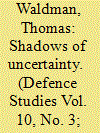

|
|
|
|
|
| Publication |
2010.
|
| Summary/Abstract |
The concept of chance has often been approached by military thinkers in either an unreasonably fatalistic or complacently dismissive manner. However, Carl von Clausewitz (1780-1831) developed a more accurate and realistic conception. For him, chance in war is an inescapable yet ambiguous phenomenon: it can create opportunities to be exploited or equally dash the best laid plans. Frequently disregarded in theory, Clausewitz maintained that chance, uncertainty, and friction are central to the nature of war, along with the human qualities required to overcome them such as courage, determination, and adaptability. Modern developments have not rendered these insights obsolete and, if anything, they hold even greater relevance to contemporary warfare. Western militaries fighting in Iraq and Afghanistan have been continually challenged by chance events and unforeseeable setbacks. Overconfidence bred by technological superiority has contributed to militaries inadequately capable of confronting unexpected developments in all of war's dimensions. Understanding Clausewitz's ideas can help prepare military leaders for the unpredictable in war.
|
|
|
|
|
|
|
|
|
|
|
|
|
|
|
|
| 7 |
ID:
163599
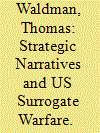

|
|
|
|
|
| Summary/Abstract |
The way US rationales for delegating military tasks to proxy forces are communicated and perceived contributes to strategic outcomes.
|
|
|
|
|
|
|
|
|
|
|
|
|
|
|
|
| 8 |
ID:
159147
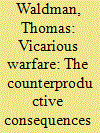

|
|
|
|
|
| Summary/Abstract |
This article examines contemporary modes of American warfare. It posits the concept of “vicarious warfare” as a means of capturing prominent patterns in warfighting approaches. Although rooted in long-standing traditions of military practice, vicarious warfare is sufficiently novel as to be identifiable as a distinct phenomenon. The precise manifestation or combination of vicarious methods vary according to the specific circumstances and political contexts prevailing in different theaters. However, America’s general preference is to fight its wars by delegating tasks to proxies and limiting exposure of its own military to danger. Where U.S. forces are employed directly, this takes place largely in the shadows. Such approaches have clear attractions, offer undoubted tactical advantages, and permit successive administrations to maintain a persistent tempo of operations that evades rigorous democratic scrutiny. Yet, prominent cases and numerous studies suggest that vicarious warfare has a high potential to generate counterproductive effects and significant strategic harm.
|
|
|
|
|
|
|
|
|
|
|
|
|
|
|
|